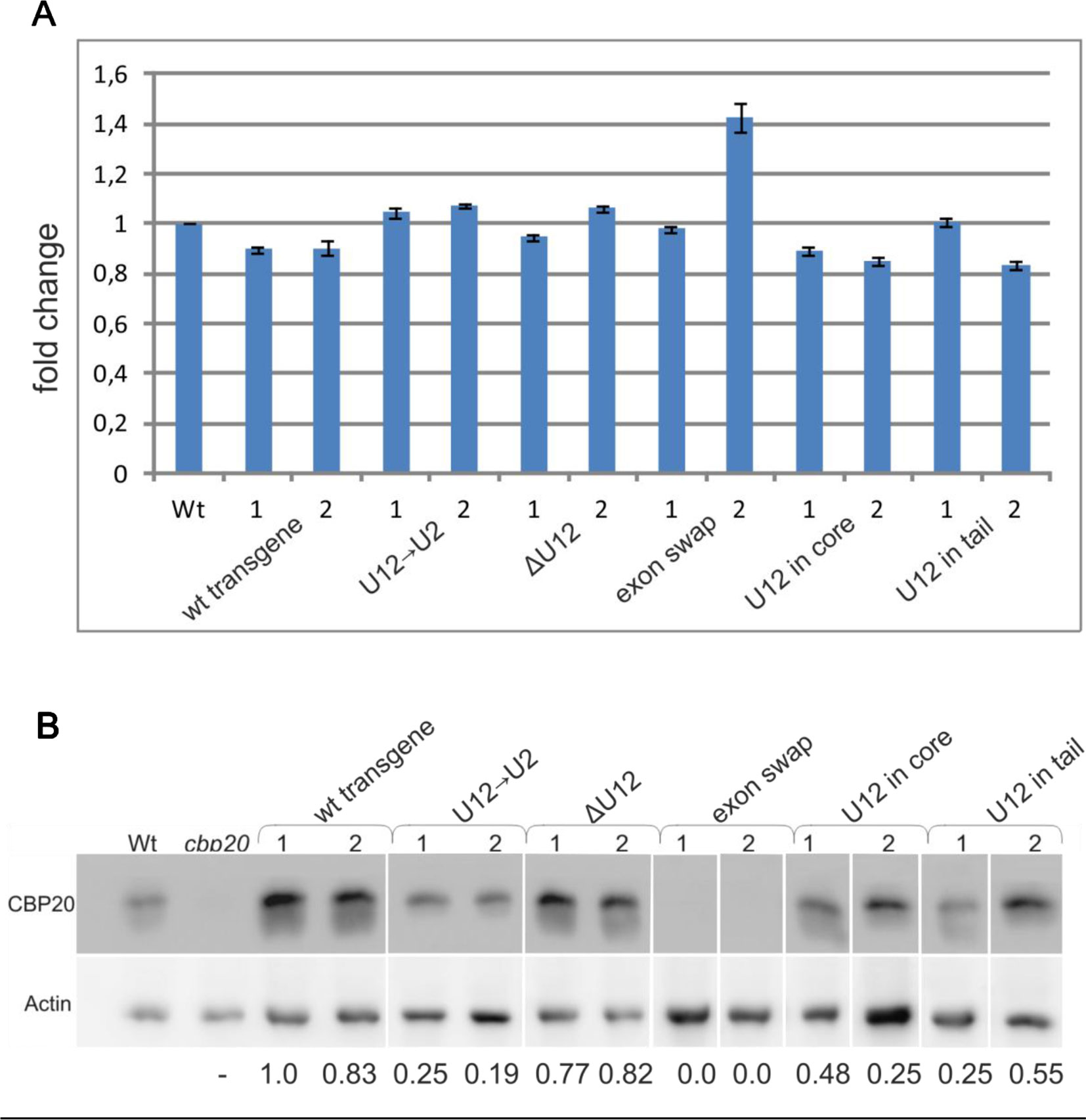- 1Department of Gene Expression, Institute of Molecular Biology and Biotechnology, Faculty of Biology, Adam Mickiewicz University in Poznan, Poznan, Poland
- 2Department of Integrative Genomics, Institute of Anthropology, Faculty of Biology, Adam Mickiewicz University in Poznan, Poznan, Poland
- 3Department of Computational Biology, Institute of Molecular Biology and Biotechnology, Faculty of Biology, Adam Mickiewicz University in Poznan, Poznan, Poland
A Corrigendum on
A Role of U12 Intron in Proper Pre-mRNA Splicing of Plant Cap Binding Protein 20 Genes
by: Pieczynski M, Kruszka K, Bielewicz D, Dolata J, Szczesniak M, Karlowski W, Jarmolowski A and Szweykowska-Kulinska Z (2018) Front. Plant Sci. 9:475. doi: 10.3389/fpls.2018.00475
In the original article, there was a mistake in both the figure and the legend for Figure 6 as published. The western blot representing recognition of CBP20 in the wild type and various mutants of this gene in A.thaliana, is fused, because the original blots contained data from additional transgenic lines, which are not included in the paper. The data are from two independent western blots. All calculations concerning the amount of the CBP20 protein were carried out separately for each western blot. The correct figure and the legend for Figure 6 appears below.

Figure 6 The localization, lack or replacement of the U12 intron in the CBP20 gene does not influence the total level of the CBP20 transcript but impacts the level of CBP20 protein in plants. (A) Real-time qPCR analysis of the total level of the CBP20 transcript in maxi-gene transgenic lines. For each construct, two independent transgenic lines were analyzed. Wt – wild-type plants; cbp20 – cbp20 mutant line; wt transgene – wild-type CBP20 gene structure; U12→U2 – CBP20 gene in which the original U12 intron was replaced with the U2 intron derived from the Arabidopsis CBP80 gene; ΔU12 – CBP20 gene with U12 intron deletion; exon swap – the CBP20 gene in which exons no. 4 and no. 5 flanking the U12 intron have been exchanged; U12 in core – a derivative of the U12→U2 construct in which the U12 intron has been introduced between exons no. 3 and no. 4; and U12 in tail – derivative of the U12→U2 construct in which the U12 intron has been introduced between exons no. 5 and no. 6. The CBP20 mRNA level in Wt was taken as 1. Values are shown as the mean ± SD (n = 3) from three independent experiments. (B) Western blot analysis of CBP20 protein levels in transgenic Arabidopsis plants. For each construct, two independent transgenic lines were analyzed. Upper panel – immunoblot using antibodies against CBP20 protein; lower panel – immunoblot with antibodies against actin used as a loading control. Numbers below the western blot image are relative intensities of CBP20 bands calculated using the wt transgene (line 1) CBP20 level as 1. Lines are described as previously. The western blot representing recognition of CBP20 in wild type and various mutants of this gene in A.thaliana is fused because the original blots contained data from additional transgenic lines, not included in the paper. The data are from two independent western blots. All calculations concerning the amount of the CBP20 protein were carried out separately for each western.
The authors apologize for this error and state that this does not change the scientific conclusions of the article in any way. The original article has been updated.
Keywords: U12 introns, U2 introns, mRNA splicing, CBP20, Arabidopsis thaliana
Citation: Pieczynski M, Kruszka K, Bielewicz D, Dolata J, Szczesniak M, Karlowski W, Jarmolowski A and Szweykowska-Kulinska Z (2019) Corrigendum: A Role of U12 Intron in Proper Pre-mRNA Splicing of Plant Cap Binding Protein 20 Genes. Front. Plant Sci. 10:1287. doi: 10.3389/fpls.2019.01287
Received: 13 September 2019; Accepted: 16 September 2019;
Published: 11 October 2019.
Approved by: Frontiers in Editorial Office, Frontiers Media SA, Switzerland
Copyright © 2019 Pieczynski, Kruszka, Bielewicz, Dolata, Szczesniak, Karlowski, Jarmolowski and Szweykowska-Kulinska. This is an open-access article distributed under the terms of the Creative Commons Attribution License (CC BY). The use, distribution or reproduction in other forums is permitted, provided the original author(s) and the copyright owner(s) are credited and that the original publication in this journal is cited, in accordance with accepted academic practice. No use, distribution or reproduction is permitted which does not comply with these terms.
*Correspondence: Artur Jarmolowski, YXJ0amFybW9AYW11LmVkdS5wbA==; Zofia Szweykowska-Kulinska, em9mc3p3ZXlAYW11LmVkdS5wbA==
†These authors have contributed equally to this work
 Marcin Pieczynski
Marcin Pieczynski Katarzyna Kruszka
Katarzyna Kruszka Dawid Bielewicz
Dawid Bielewicz Jakub Dolata
Jakub Dolata Michal Szczesniak
Michal Szczesniak Wojciech Karlowski
Wojciech Karlowski Artur Jarmolowski
Artur Jarmolowski Zofia Szweykowska-Kulinska
Zofia Szweykowska-Kulinska